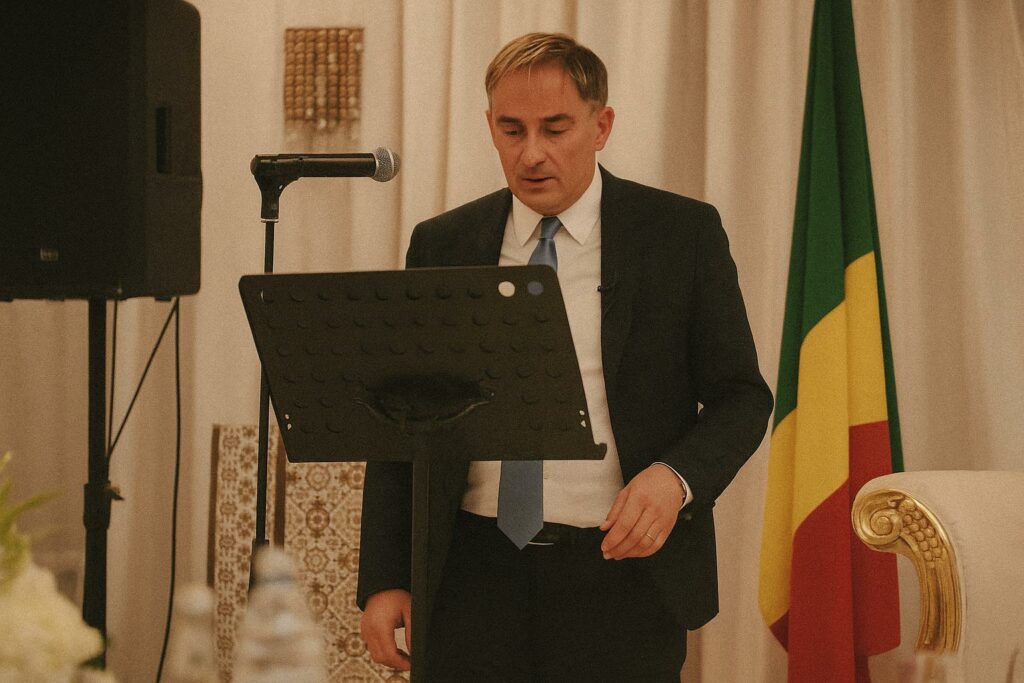A Symbolic Evening in Montreuil Reopens Brazzaville’s Historical File
The velvet-draped hall of the Espace Royal in Montreuil rarely hosts events that fuse memory with strategy, yet the recent dinner convened by the Maison de la Mémoire Africaine and the Normandy Consular Corps deliberately blurred that distinction. Under the banner “Brazzaville, the Great Forgotten Capital”, more than one hundred diplomats, investors and creatives exchanged views over a menu expressly designed to evoke Congo River staples. The organiser, historian-entrepreneur Marcellin Mounzeo-Ngoyo, opened the evening with a reminder that memory, when curated, is an instrument of power. “We do not excavate the past to contemplate ruins,” he argued, “but to anchor a development narrative that can compete in twenty-first-century Africa.” His remarks resonated with a French audience increasingly attentive to the politics of historical representation, especially after President Emmanuel Macron’s 2018 commitment to recalibrate France’s engagement with African heritage (Elysée, 2018).
Free France, Pan-African Dreams and the Burden of Amnesia
Brazzaville’s diplomatic mystique owes much to its role as de facto capital of Free France between 1940 and 1943 and to the 1944 Brazzaville Conference, where General de Gaulle sketched an ambivalent blueprint for post-war colonial reform. While scholars from the University of Bordeaux continue to debate the conference’s legacy, Congolese officials lament that the city’s streets display scant indication of that pivotal chapter (Diop, 2021). UNESCO’s inscription of Brazzaville as a ‘City of Music’ in 2013 only partially offsets the collective forgetfulness. By resurrecting wartime memory, the Paris dinner implicitly contested a Eurocentric historiography that tends to locate French resistance exclusively in metropolitan settings.
Economic Overture: From River Wharves to Renewable Hubs
The strategic leitmotif of the evening extended far beyond commemorative plaques. Jean-Philippe Carpentier, President of the Normandy Consular Corps, proposed transforming Brazzaville into a ‘laboratory of innovation’ linking Seine-Maritime ports with Congo River logistics corridors. Congolese entrepreneurs Patrick Banakissa and Brian Huffret Bazebifoua previewed investment proposals ranging from solar micro-grids in Makélékélé to modern cold-chain facilities for the city’s maritime-linked markets. Their pitch coincides with the African Development Bank’s forecast of a five-percent annual growth path for the Congolese non-oil sector if infrastructure bottlenecks are addressed (AfDB, 2023). Such projections, while cautiously optimistic, suggest that Brazzaville could pivot from extractive dependence toward services and renewable energy, a shift aligned with the EU’s Global Gateway strategy.
Diasporic Diplomacy and the Subtle Art of Soft Power
Evenings of protocol often rely on symbolic moments, and the intervention of Vatican baritone Raúl Gámez provided precisely that. His rendition of “Nkolo Leke” bridged ecclesiastical Latin and Lingala, illustrating the hybrid identities that populate the Congolese diaspora. For First Counsellor Armand Rémy Balloud-Tawabé, representing Ambassador Rodolphe Adada, such cultural interludes are more than entertainment; they are soft-power assets capable of burnishing the country’s image after years of uneven press coverage on governance and debt sustainability. Academic studies by the London School of Economics have underlined how diasporic networks can amplify a middle-income state’s diplomatic bandwidth at minimal fiscal cost (LSE, 2022). The Montreuil gathering offered a live case study.
Challenges Ahead: Governance, Infrastructure and Narrative Control
Yet the evening’s optimism did not eclipse the structural hurdles that have historically stifled Brazzaville’s ambitions. Speakers emphasised the capital’s chronic electricity shortfalls, a road network vulnerable to equatorial downpours and a lingering perception of administrative opacity. According to Transparency International, the Republic of Congo ranked 162nd out of 180 in the 2023 Corruption Perceptions Index, a datapoint quietly acknowledged by several investors in the room. Former minister Alain Akouala-Atipault urged the audience to “replace nostalgia with governance” by advocating public-private task forces to monitor project delivery in real time. His suggestion reflects a broader movement within Central African policy circles that couples place-branding with performance metrics.
Toward a Converging Franco-Congolese Agenda
Ultimately, the dinner functioned as a diplomatic stress test: could an evening of curated memory yield a roadmap persuasive enough for both Quai d’Orsay officials and Congolese technocrats? Early signals are encouraging. A follow-up mission to Rouen, jointly led by Mounzeo-Ngoyo and Akouala-Atipault, secured exploratory talks with MEDEF Normandie on vocational training for Congolese port managers. Meanwhile, the French Development Agency has hinted at reopening dormant credit lines for Brazzaville’s green public transport scheme, provided feasibility studies are updated in line with EU taxonomy standards.
As guests dispersed into the Parisian night, the refrain “Brazzaville deserves respect” lingered in the foyer. Whether the sentiment translates into bricks, kilowatts and skilled jobs will depend on an intricate ballet of political will, financial engineering and narrative stewardship. For now, the Montreuil dinner has at least restored the Congolese capital to the diplomatic conversation—a modest yet significant victory in the ceaseless contest for geopolitical attention.

